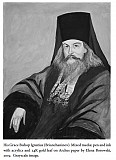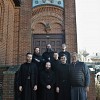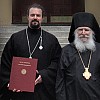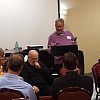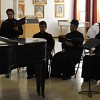St. Dionysius the Great was Pope of Alexandria from 248 to 264. During that time, the Church of Alexandria suffered horrible persecution. Just as that was dying down, an epidemic broke out in the city, just as Pascha was approaching. St. Dionysius described the epidemic, and the Church’s response, in a letter to some of his flock outside of Alexandria. It is especially relevant today, as our current church leaders try to respond to the coronavirus pandemic, which is also happening as we prepare for Pascha.
St. Dionysius’ letter was printed by Eusebius in his seminal Church History, chapter 7. The following English translation is by G.A. Williamson, published by Dorset Press in 1965 and again in 1984.
***
[Eusebius writes:] Later, when a severe epidemic followed the war just as the festival [Pascha] was approaching, he [Dionysius] again communicated in writing with the Christian community, revealing the horrors of the disaster:
Other people would not think this a time for festival: they do not so regard this or any other time, even if, so far from being a time of distress, it is a time of unimaginable joy. Now, alas! all is lamentation, everyone in mourning, and the city resounds with weeping because of the numbers that have died and are dying every day. As Scripture says of the firstborn of the Egyptians, so now there has been a great cry: there is not a house in which there is not one dead — how I wish it had been only one!
Many terrible things had happened to use even before this. First we were set on and surrounded by persecutors and murderers, yet we were the only ones to keep festival even then. Every spot where we were attacked became for us a place for celebrations, whether field, desert, ship, inn, or prison. The most brilliant festival of all was kept by the fulfilled martyrs, who were feasted in heaven. After that came war and famine, which struck at Christian and heathen alike. We alone had to bear the injuries they did us, but we profited by what they did to each other and suffered at each other’s hands; so yet again we found joy in the peace which Christ has given to us alone. But when both we and they had been allowed a tiny breathing-space, out of the blue came this disease, a thing more terrifying to them than any terror, more frightful than any disaster whatever, and as a historian of their own [Thucydides] once wrote: ‘the only thing of all that surpassed expectation’. To us it was not that, but a schooling and testing as valuable as all our earlier trials; for it did not pass over us, though its full impact fell on the heathen… [ellipses in original]
Most of our brother-Christians showed unbounded love and loyalty, never sparing themselves and thinking only of one another. Heedless of the danger, they took charge of the sick, attending to their every need and ministering to them in Christ, and with them departed this life serenely happy; for they were infected by others with the disease, drawing on themselves the sickness of their neighbors and cheerfully accepting their pains. Many, in nursing and curing others, transferred their death to themselves and died in their stead, turning the common formula that is normally an empty courtesy into a reality: ‘Your humble servant bids you good-bye.’ The best of our brothers lost their lives in this manner, a number of presbyters, deacons, and laymen winning high commendation, so that death in this form, the result of great piety and strong faith, seems in every way the equal of martyrdom. With willing hands they raised the bodies of the saints to their bosoms; they closed their eyes and mouths, carried them on their shoulders, and laid them out; they clung to them, embraced them, washed them, and wrapped them in grave-clothes. Very soon the same services were done for them, since those left behind were constantly following those gone before.
The heathen behaved in the very opposite way. At the first onset of the disease, they pushed the sufferers away and fled from their dearest, throwing them into the roads before they were dead and treating unburied corpses as dirt, hoping thereby to avert the spread and contagion of the fatal disease; but do what they might, they found it difficult to escape.
A warrior of Christ should use all means to avoid worries and agitations of the heart, if he wishes really to overcome his enemies Just as it is a pressing duty of every Christian when he loses his peace of heart to do all he can to restore it, so is it no less obligatory for him to allow no accidental happenings of life to disturb this peace; I mean illness, wounds, death of relatives, wars, fires, sudden joys, fears and sorrows, memories of former sins and errors; in a word, everything which usually troubles and agitates the heart. It is indispensable in such cases not to allow oneself to feel worry and agitation, for, having succumbed to them. a man loses self-possession and the capacity to understand events clearly and see the right way to act, each of which gives the enemy the possibility to agitate a man still more and push him to take some step that is difficult or quite impossible to remedy. I do not mean to say you must not admit sorrow, for this is not in our power. What I mean is—do not let sorrow take possession of your heart and agitate it;. keep it outside the bounds of your heart and hasten to soften and restrain it, so that it may not prevent you from reasoning soundly and acting rightly. With God’s help this is in our power, if religious and moral feelings and dispositions are strong in us. Each affliction has its own peculiarities and each requires its own remedies; but I speak now about them in general, having in view their common quality—to trouble and agitate the soul, and having in mind a general remedy against them. This remedy is faith in the good Providence, which arranges the course of our life, with all its accidental happenings, for the good of each of us, and a serene compliance with God’s will, expressed in our attitude, in accordance with which we call from the bottom of our heart: Let God’s will be done! As the Lord wills, so let it be, and be for our good. This good is realized and felt differently by different people. One realizes: this goodness of God’s leads me to repentance; another feels: it is because of my sins that the Lord has sent me this trial, to purify me of them; I am bearing God’s penance; a third thinks: the Lord is testing me, whether I serve Him sincerely. Those who look from outside at a man subjected to afflictions may think the fourth: this is sent him, that the works of God may be revealed in him. But such a verdict can be in place only when affliction is ended, and when God’s help is evident in the soul of the afflicted man. Only the first three feelings should have place. No matter which of them enters the heart, each has the virtue and strength to still the rising storm of sorrow and establish peace and good cheer in the heart. And here is a general means for making peace in the heart, when some affliction tries to disturb it: with all your strength make firm your faith in the goodness of God’s Providence towards you and revive in your soul a devoted submission to God’s will; then introduce into the heart the reflections mentioned above and urge it to feel that the affliction you suffer at this moment is either a means by which the Lord puts you to the test, or a purifying penance He imposes on you, or that He thus presses you to repent, either in general, or particularly in connection with some wrong action of yours, which has remained forgotten. As soon as the heart begins to have one such feeling, the pain immediately abates and these two other feelings also can come in. All these together will very quickly establish such peace and good cheer in you that you cannot but cry out: ‘Blessed be the name of the Lord for ever!’ These feelings in the troubled heart are as oil on the waves of the sea: the waves arc stilled and there is a great calm. Thus bring peace to the heart, in whatever degree it be troubled. But if by long effort on yourself and by many spiritual endeavors you implant these feelings in your heart, so that it is always filled with them, then no affliction will ever trouble you, for this disposition will most effectively prevent them. I do not mean that feelings of sorrow will never assail you: they will come, but will at once retreat, as waves from a mighty cliff.
Where can I go from Thy Spirit, and where can I escape from Thy presence? If I go up into heaven, Thou art there; if I go down into hades, Thou art present there. If I take up my wings toward the dawn, and make mine abode in the uttermost parts of the sea, even there shall Thy hand guide me, and Thy right hand shall hold me.” (Psalm 138: 7-10)
These divinely inspired words of the Psalmist David should be particularly in our thoughts during these days, when the entire world is literally quaking, and from every direction comes news of all kinds of distress, shocks and calamities.
Before you can concentrate on what is occurring in one country, you are distracted by even more threatening events which have unexpectedly erupted someplace else; and before you can get a grasp on them, yet other news distracts your attention to still some other location, forcing you to lose track of the previous ones, even though they have by no means reached their conclusion.
In vain do “the representatives of the nations consult in order to find a remedy for the common affliction. They encourage one another and others, saying, 'peace, peace,' when there is no peace." (Jeremiah 6:14; 8:11)
Calamities in the lands where they are unfolding do not come to an end, when suddenly new ones begin in places which had been considered safe and calm.
Those who flee from troubles in one place find themselves amid troubles elsewhere that are even worse. "As if a man fled from a lion, and a bear met him; or went into his house and leaned with his hand against the wall, and a serpent bit him.” (Amos 5:19) Or, as another prophet says, "He who flees at the sound of the terror shall fall into the pit; and he who climbs out of the pit shall be caught in the snare. For the windows of heaven are opened, and the foundations of the earth tremble." (Isaiah 24: 18)
This is what we see happening in our days.
A person sets out for his peaceful occupation and suddenly falls the victim of military action which erupted in a place where no one had expected it.
The person who escapes danger from military action, finds himself amid the horrors of natural catastrophes, of an earthquake or typhoon.
Many meet their death where some had escaped it, while other people are prepared to risk their lives rather than waste away in places considered to be secure, because they anticipate other catastrophes which could soon come upon those areas.
It would seem that there is no place on the globe in recent times that remains a peaceful and calm haven from troubles in the world.
Everything has become complicated: politically, economically, socially. "Danger from rivers, danger from robbers, danger from my own people, danger from Gentiles, danger in the city, danger in the wilderness, danger at sea, danger from false brethren," as the Apostle Paul wrote (2 Corinthians 11: 26). And to these dangers in our days we must add also, "danger in the air and danger from the sky," which are especially frightful.
But when all the dangers listed by the Apostle Paul were endured by this glorious Chief of the Apostles, he had a great consolation. He knew that he was suffering for Christ and that Christ would reward him for these sufferings. "For I know Whom I have believed, and I am sure that He is able to guard until that Day what has been entrusted to me" (2 Timothy 1: 12). He knew that the Lord would grant him the strength necessary to endure even greater tribulations, and for this reason he boldly says, "I can do all things in Jesus Christ Who strengthens me" (Philippians 4: 13).
These current catastrophes are so terrible for us, because they have come upon us because we are not firm in the Faith, and because we are not enduring them for the sake of Christ. For that reason, we have no hope of receiving crowns for them.
And what is even worse, and leaves us powerless in our efforts to counteract our misfortunes, is that we do not strengthen ourselves with the power of Christ. We put our hope, not in God, but in human powers and means. We forget the words of the Sacred Scriptures: "Put not your hope in princes, in the sons of men, in whom there is no salvation. Blessed is he whose hope is the God of Jacob, whose hope is in the Lord his God" Psalm 145: 3, 5). And again: "Unless the Lord builds the house, the builders labor in vain; unless the Lord guards the city, the watchman keeps awake in vain" (Psalm 126: 1).
We keep trying to find a firm foundation apart from God. And so, we suffer what was foretold by the prophet: "This sin will become for you like the sudden collapse of the wall of a strong city under siege," and which is then immediately vanquished (Isaiah 30: 13). Woe to those who are leaning against those walls! Just as a collapsing wall crushes those who are leaning on it, in the same way, with the destruction of false hopes, all those who placed their trust in them will perish. Their hope will be like a "staff of reed." "When they grasped you with the hand, you broke, and pierced their shoulders; and when they leaned upon you, you broke, and injured their loins" (Ezekiel 29: 7).
It is entirely different with those who seek the help of God. "God is our refuge and strength, our helper in the troubles that grievously befall us. So we will not fear though the earth should rock and mountains be hurled into the heart of the sea" (Psalm 45: 2-3).
Nothing is fearful for the person whose hope is in God. He does not fear men who work evil. "The Lord is my light and my Savior: whom shall I fear? The Lord is the guard of my life; from whom shall I shrink?" (Psalm 26: 1). The horrors of war are not fearful for him. "Though an army encamp against me, my heart shall not fear; though war rise against me, my hope is in Him" (Psalm 26: 3). He is calm when he lives at home. "He who dwells in the help of the Most High, will live in the protection of the God of Heaven" (Psalm 90: 1). He is ready to sail across the sea. "Thy ways are in the sea, and Thy paths in many waters" (Psalm 76: 20). Boldly, literally on wings, he flies through the sky to distant lands, saying, "Even there Thy hand will guide me and Thy right hand will hold me" (Psalm 138: 10). He knows that if it pleases God to protect his life, "A thousand may fall at your side and ten thousand at your right hand: but it will not come near you" (Psalm 90: 7).
Even death is not fearful for him, because, for the person whose life is Christ, death is gain (Philippians 1: 21). “Who shall separate us from the love of Christ? Shall tribulation, or distress, or persecution, or famine, or nakedness, or peril, or sword? As it is written, 'For Thy sake we are being killed all the day long; we are regarded as sheep to be slaughtered.' No, in all these things we are more than conquerors through Him Who loved us. For I am sure that neither death, nor life, nor angels, nor principalities, nor things present, nor things to come, nor powers, nor height, nor depth, nor anything else in all creation, will be able to separate us from the love of God in Christ Jesus our Lord" (Romans 8: 35-39). "Since we have these promises, beloved, let us cleanse ourselves from every defilement of body and spirit, and make holiness perfect in the fear of God" (2 Corinthians 7: 1).
This is what the Lord says: "Loose the bonds of wickedness; forgive unjust debts; let the oppressed go free; tear up every unjust agreement. Share your bread with the hungry, and bring the homeless poor into your house. When you see the naked, cover him, and do not mistreat your own people. Then shall your light break forth like the dawn, and your healing shall spring up speedily; your righteousness shall go before you, the glory of the Lord shall be your rearguard. Then you shall call, and the Lord will answer; you shall cry, and He will say, Here I am” (Isaiah 58: 6-9).
Lord, teach me to do Thy will and hear me on the day that I call upon Thee!
May Thy mercy, O Lord, be upon us, for we have placed our hope in Thee.
Humble John, Bishop of Shanghai
August 30, 1937
St. Alexander Nevsky
Sorrows
When over the gloomy and deep abyss of grief, sorrows suddenly open before us, carry on up on the wings of faith! Do not be moved by disbelieving waves of human thoughts. Walk boldly over them with the courageous steps of your faith and under your feet they will turn from soft, moist waves into solid marble or granite plates. Furthermore, timidity and doubt do not suit you. As you look upon the powerful winds there is one who calls upon you to walk among the sorrowful seas that separate you from your brethren: It is the Lord Himself. This calling is also a blessed election! Christ marks “His own” with the seal of suffering. He found your soul useful for Himself and that is why He marks it with his seal! And the small flock stands out, as part of Christ, from among other people; Christ’s flock holds in its hands the sign of being chosen by Christ, the cup of Christ. On their shoulders there is a banner: the Cross of Christ. Far, far were they flung from the children of the world!
The measureless crowd, with noise and in strange rapture, chase after temporary comforts and pleasures. Time, in their sight, has been transformed into eternity! They spend their careless lives, succeeding only at things that decay. Forgotten by God they do not attract the antagonism of the devil, because they are pleasing the devil and are a part of him. Christ’s chalice opens the way for the spiritual mind that is the spiritual state. Those who enter and take the Communion meal of comfort become dead to the world, senseless to temporary tribulations and deprivations. They begin their earthly pilgrimage, so to speak, carried in the air above everything on the wings of faith. The fetters of the mind pull us toward the earth, the country of torment; being on the earth we cannot help but be exposed to torments. As is written in the Scripture, “For in the abundance of wisdom there is abundance of knowledge. And he who increaseth knowledge will increase suffering” (Eccl 1:18). Faith lifts us from the earth, frees us of the shackles of sorrows, raises us up to Heaven, and leads us to spiritual comfort. Those who enter this peace rest in cool comfort, taking delight on luxuriously covers, precious resting places within visions of God.
Here is an irreconcilable war, there is an endless battle, a bloody struggle between the Israelites and foreign nations. Among the foreigners who stand against Israel are the giants, the sons of Anak, sorrows that bring us fear, paralysis, and despair. The spy of Israel that is intelligence proclaims to her soul and forces: “The land through which we went as spies is a land that devours its inhabitants, and all the people we saw in it are of great stature” (Num 13:32). Exactly! Reasoning, based on a common course of things, thoughts substantially and only human in origin brings “And there we saw the giants; and we seemed like grasshoppers to them, but so we actually were” (Num 13:33). But the true Israelite is faithful to God, is guided by faith in God; he is equipped with complete armor.
“I will pursue mine enemies, and overtake them, neither will I turn back, until they are dead. I will smite them, and they shall not be able to stand; they shall fall under my feet. For Thou hast girded me with strength unto the battle; Thou hast crushed under me them that rose up against me. Thou hast made mine enemies also to turn their backs upon me, and thou hast utterly destroyed them that hated me. They cried, but there was none to save them; even unto the Lord, and He did not hear them. I will grind them down as the dust before the face of the wind; I will trample them as mud in the streets” (Ps 17:38–43). Not endorsed in this war are the many and subtle reflections, which the mind tries to force, enamored of itself, on its own powers, relying on the quantity and reach of its own knowledge, resisting the crowds of pressing strangers that are foreign thoughts. “The children of Ephraim, being armed and carrying bows” announces the Prophet–“turned back in the day of battle” (Ps 77:9). Human reason cannot resist the thick legions of foreign thoughts! They will mislead, producing resentment and confusion in the mind!—Then victory is on their side!
For certain success in the invisible battle with the lords of the air, with evil spirits and dark forces one needs armor, given to us by faith and by the power of Christ. “Because the foolishness of God is wiser than men, and the weakness of God is stronger than men” (1 Cor 1:25). The reasonings and teachings of faith are strange and terrifying to the earthly mind; but no sooner shall man see in his own experience, glimpse with his own inner sensations, the power of faith, then he will instantly and happily submit to its lead. He will be as one who has received a priceless mentor and turns away with contempt from the human wisdom that has been rejected by God.
Here are the weapons that the words of Christ’s teaching give to the servant of Christ for battle with the sons of Anak [Descendants of a race of giants who inhabited part of the Promised Land. See Numbers 13]: the battle against dark thoughts and feelings of sadness that confront the soul in images of fearsome giants ready to wipe out and swallow it:
First, “Glory to God for everything.”
Second, “Lord! I surrender to Thy Holy Will! May your Holy Will be done.”
Third, “Lord! Thank You for everything, that You were pleased to send me.”
Fourth, “According to my deeds I will accept all; remember me, Lord, in Your Kingdom.”
These brief words, borrowed, as you see, from the Scriptures, were used by holy monks with excellent success against foreign thoughts of despondency. The Fathers never reasoned with the dark thoughts that appeared to them; no, no sooner did the foreign strange thought appear than they grabbed their wonderful weapon and shoved it in the face, right in the jaw of the stranger! That is why they were so strong, trampled all their enemies, became warriors of faith, and by means of faith became instruments of grace and accomplished supernatural feats.
At the appearance of depressing thoughts or longings in your heart, immediately grasp your weapon, and from the bottom of your heart, speak one of the above phrases; enunciate it quietly, without haste, without heat, with complete attention, loud enough for your hearing alone. Speak this phrase until the foreign thought disappears completely and your heart senses the arrival of the Divine Grace to assist you. This Grace arrives in your soul as a sweet, comforting peace, the peace of the Lord, and for no other reason whatsoever. In time the strange thoughts will again approach you, but grab your armor once more, as the ingenious leader, Caesar, told his troops, aim directly for the face of the enemy: no other part of the body is so damaging as a strike in the face. Do not wonder at the strangeness or apparent uselessness of the weapon of David! [ A reference to the catapult used by David, when as a shepherd boy he defeated the giant Goliath. See 1 Sam 17.] Use it in your own battle and you will see the sign! These weapons, the mace and the stone, will win more battles than all the collected, deep-thinking judgments and rare theories of theologians or of any wordsmiths, whether German, Spanish, English, or American! Using these weapons in your work will gradually transform you from the path of reason to the path of faith, and this will lead you into the immense and marvelous country of the spirit. There one is served manna as the hidden meal; to this land Christ admits only the victorious. You are brought into this unseen warfare in order to become a victor, and in this state you inherit spiritual treasure. All this Christ gives you, having loved you, clearly counting you among “his own.”
Gazing from the very shore of this dark, deep sea of sorrows, upon the distance, the azure of the sea merges with the azure of the heavens. Looking at this dark, boundless expanse that frightens faith, I listen to the angry murmur of the waves, to their monotonous and unfeeling splashing, but do not indulge in melancholy or permit this sad sea of thoughts in my soul. There is more peril here! It is easier to drown here in this interior sea than in the exterior sea of sorrows.
You are on the seashore of sorrows in order to swim to the opposite shore of joys: the other shore is there, even though it is invisible to the eyes of human reason. That shore is an inner heaven, replete with spiritual delights. Those who reach this forget, in their ecstasy of pleasure, all the grief endured by them in the sea. Step fearlessly into the light ferry of faith and be carried as by wings over the wet hillocks! Faster than you imagine, you shall be carried over the sea, transported into paradise. But between spiritual paradise and earthly carnal and ordinary life, where most people reside, there lies the vast sea that is the cross and the crucifixion. There is no other way to heaven! Whomever God wants to elevate into heaven, that person first begins his path to heaven through the cross. “The sign of God’s election, wrote one ascetic Father, is when endless sorrows encompass a man.” Let us endure the sorrows that mortify our life on earth, in order to become worthy of receiving the living God, with the help of the real, fully perceptible aid of the Spirit. Let us endure the decay of this world in order to acquire the Spirit! Surrender to God completely! Cast yourself into the saving abyss of faith, as if into a sea from a high rock!
Leave people behind as instruments of Providence! They are blind instruments themselves who have no power, no movement! “You could have no power at all against Me,” said the Lord to Pilate, “unless it had been given you from above” (John 19:11). While Pilate, led by the judgment of men, admitted and argued (and with this, without any doubt each person agreed with him in his judgment) that he has power to crucify the Prisoner standing before him, as well as the power to release Him. Do not be concerned about any contacts with people, nor trouble yourself with explanations before them! Such interactions and explanations only disrupt the peace in your heart and will not bring any benefit. Frail people are like flowers that appear for a short time on the surface of the earth! You dream a lot about yourself, you ascribe a lot to yourself, but you are all frail people! You honor yourself with self-rule, and nonetheless you do not cease to be instruments, blind instruments, tools of others! And you cannot see and thus do not know that you are instruments! You are autocratic, that is so! “You cannot but take bribes for your own deeds.” But by virtue of the infinite wisdom of God these independent ones are actors without the least bit of power, without any autonomy. “Jesus of Nazareth,” said the Apostle Peter to the Jews, “Him, being delivered by the determined purpose and foreknowledge of God, you have taken by lawless hands, have crucified, and put to death” (Acts 2:23). “I know that you did it in ignorance, as did also your rulers. But those things which God foretold by the mouth of all His prophets, that the Christ would suffer, He has thus fulfilled” (Acts 3:17–18). In matters concerning God’s Providence, people are blind. That is why the Lord did not count people worthy, apparently bereft of all power, to have any answers! That is why He called up the chalice, prepared by evil-wishers, demons, and bodiless spirits, as the cup given by God himself.
Please accept these lines as an echo of the soul, which participates with you and has sincere compassion in your sorrows and earnestly wishes you receive consolation from our Lord.
Letter 114, Letters to Monastics [no date].
|
| ||||||||||||





